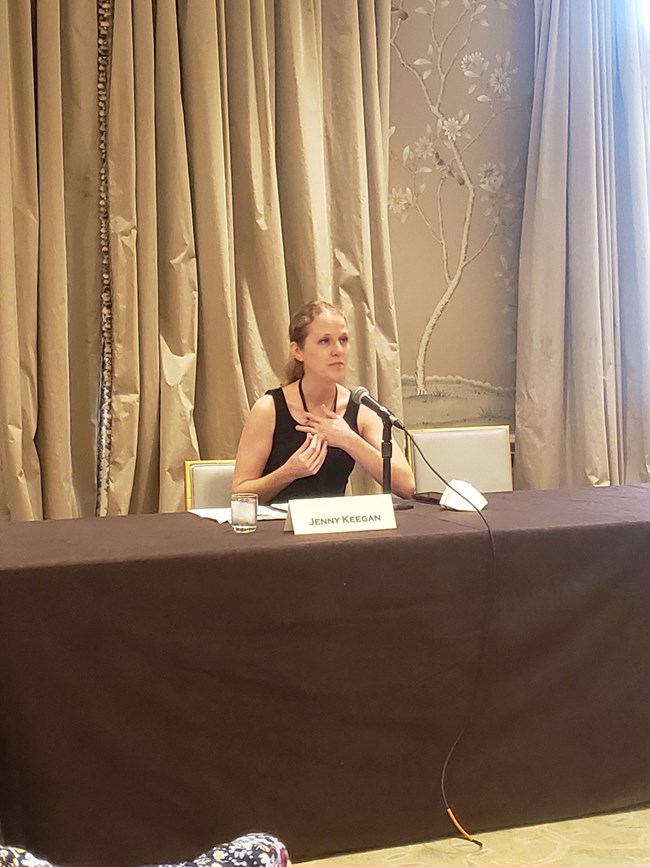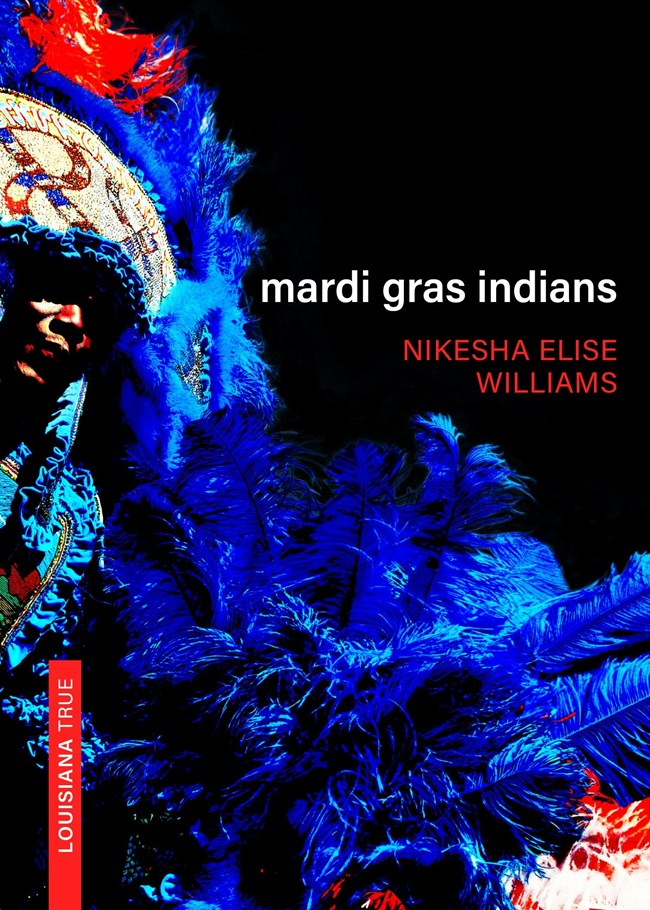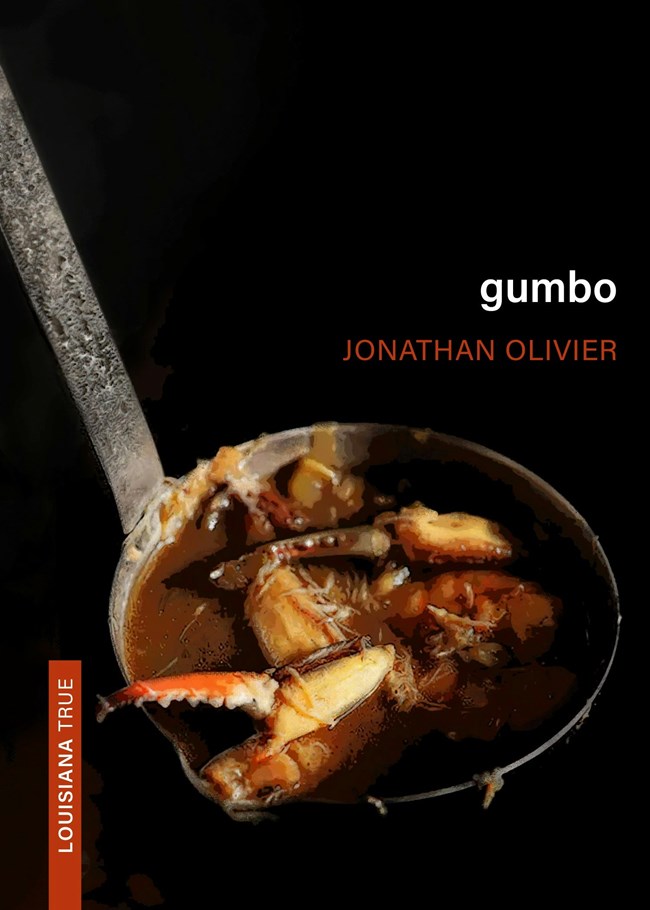Last updated: November 29, 2023
Article
Podcast 143: Writing about Louisiana Culture
Starting a Series about Aspects of Louisiana Culture

Image courtesy of Jenny Keegan
Jenny Keegan: Jenny Keegan. I am the Trade Acquisitions editor at LSU Press, responsible for acquiring our titles on regional topics as well as books for general readers. Thank you so much for having me.
Catherine Cooper: Thank you so much for joining us. You are in charge of the Louisiana True Series. Can you talk about what that series is and how the initiative came about?
Jenny Keegan: Yeah, absolutely. The Louisiana True Series is a series of short, fun books. They're running about a 125, a 175 pages, so they make great gifts. And each book introduces the reader to one element of Louisiana culture. Kind of our joke pitch in-house for the series was that each book explores a topic that as a Louisianian you have to explain to out-of-towners. So our first book was Mardi Gras Beads by the wonderful Doug MacCash, and I swear we made that the first one because I was so tired of telling everyone that only tourists flash people for beads. So the first of those books came out in the spring of last year. Since then, we've added Nikesha Williams's Mardi Gras Indians, Rien Fertel's Brown Pelican, and Burke Bischoff's Po'Boy. And then in the spring of next year, we're going to have Jonathan Olivier's Gumbo. We have a lot more in the works, and I encourage your listeners to reach out to me with any suggestions for topics or authors because we want this series to continue to grow.
Finding Topics and Authors
Jenny Keegan: When we started thinking about this series, it was really a collaborative effort with everyone at the press. So we got together and talked about the series as a whole. Our marketing manager, James Wilson, came up with the title Louisiana True, and we just kind of sat down and started throwing out ideas for topics. I think I sent an all staff email to the press as well, to be like, "What are some things that you would be interested in learning more about or that you think other people would be interested in learning more about?" And they sent me a ton of great ideas.
I've also had authors bring ideas to me that I hadn't considered before. So I'll sometimes reach out to an author and I'll say, "I have a topic in mind. I think you'd be great at it based on your past writing." But then they end up being interested in something completely different. And sometimes it turns out that their other idea isn't a perfect fit for the series, but could be a fit for a standalone book on LSU Press's list because sometimes an author thinks they want to write 35,000 words about a topic, and it turns out they want to write 85,000 words about the topic.
So I mean, it's been a great way to start conversations and hear about what interests people. So far, I have mostly been reaching out to people whose writing I admire to ask them if they're interested in writing a book for the series because it is still pretty new. But I certainly continue to be interested in hearing from people who have ideas, and I would love for people to reach out to me with suggestions and proposals because one of the things that was the goal of this series and that continues to be brought to light the more I work on it, is that Louisiana has a really remarkable and fascinating culture. It was influenced by Native cultures, by French and Spanish colonization, centuries of African enslavement, and by our place on the coast and at the mouth of the Mississippi River. So many people have come to and through Louisiana, bringing their culture with them, and we want the series to really honor and reflect that as much as possible.
I've also had authors bring ideas to me that I hadn't considered before. So I'll sometimes reach out to an author and I'll say, "I have a topic in mind. I think you'd be great at it based on your past writing." But then they end up being interested in something completely different. And sometimes it turns out that their other idea isn't a perfect fit for the series, but could be a fit for a standalone book on LSU Press's list because sometimes an author thinks they want to write 35,000 words about a topic, and it turns out they want to write 85,000 words about the topic.
So I mean, it's been a great way to start conversations and hear about what interests people. So far, I have mostly been reaching out to people whose writing I admire to ask them if they're interested in writing a book for the series because it is still pretty new. But I certainly continue to be interested in hearing from people who have ideas, and I would love for people to reach out to me with suggestions and proposals because one of the things that was the goal of this series and that continues to be brought to light the more I work on it, is that Louisiana has a really remarkable and fascinating culture. It was influenced by Native cultures, by French and Spanish colonization, centuries of African enslavement, and by our place on the coast and at the mouth of the Mississippi River. So many people have come to and through Louisiana, bringing their culture with them, and we want the series to really honor and reflect that as much as possible.
An Opportunity to Be Creative and Curious

Image Courtesy of LSU Press
Jenny Keegan: Oftentimes authors will come to me or I will come to them with this series, and they maybe haven’t written a book before and they aren’t sure how to approach it. So I do try to be really collaborative and as helpful as possible. The chief guideline for us has been the word count. So these are running between 25 to 35,000 words. That works out to about 50 to 100 pages in Microsoft Word, depending on if you’re double spacing and what font you’re using. So the main guideline is that length and then the instruction to share the basics of what the food, tradition, place, custom is. Beyond that, I really invite authors to be creative.
So we’ve had books in the series that are written as a very straightforward, chronological accounting of the history of the thing or custom, but other books might look at the topic through snapshots of moments in time, which the Brown Pelican book does. Or could take a more personal lens focusing on people and their experiences in which the Mardi Gras Indians book does. That author, Nikesha Williams, drew very heavily on interviews with Black Masking Indians, and she got some really interesting stories from them about how they came into the tradition, how they continue to make their suits, passed those skills onto their family members and so forth. So essentially, I want the authors to have fun because in my experience when an author is having fun with their topic, that really comes through for the reader and the reader is then able to have as much fun as the author is. So I always encourage authors to look for the elements of each topic that they find the most exciting and interesting and focus on those.
To your question about audience, I would say the audience is anyone from Louisiana who wants to know more about where our traditions came from, and then anyone coming into Louisiana who wants to understand why we are the way we are. They're great books to give someone who's coming to our state for the first time, maybe as a tourist or especially if someone's moving here. These are very good gift books for new Louisiana transplants. But then I've also found, I was born and raised here, and I learned new stuff in every single book. Our authors are just doing such a good job of getting really great interviews, going into archives, pulling out old newspapers, finding all this information that I then get to learn about too. So it's wonderful.
Introducing People to Louisiana

Image Courtesy of LSU Press
Jenny Keegan: Well, I do think Louisiana has a really unique culture. Like I said, because we're situated right at the mouth of the Mississippi River, there've been so many different cultures that have come in and through Louisiana, and I think all of them have left a mark on our culture and blended together in this really lovely way. There's something special about Louisiana, and I think we as a state, I think people have really cared a lot about preserving those kind of folkways and those cultural traditions from all these different backgrounds, whether it be Native people, Cajun people, Creole people. And we've all kind of lived cheek by jowl, especially in New Orleans, but across the state. So people have really blended their traditions into each other.
I mean, one example that I always think of is in our Po'Boy book, one of the chapters is talking about Vietnamese Po'Boys. And whenever anyone comes to Louisiana and I suggest getting Vietnamese Po'Boys, they're like, "Well, how is that different than báhn mi? And I'm like, it's not. It's báhn mi. These two culinary traditions grew up a lot separately. They grew up separately, and now we've influenced each other because so many Vietnamese refugees came here during the Vietnam War, and that's just one example. But I think there are a lot of things like that in Louisiana where especially because we have such a strong culture around sharing and enjoying food together, it's made it really, I hope, a welcoming place for a lot of different communities and offered a way for different immigrant communities to find a path in to Louisiana culture and making a home here.
The goal of this series is similar to the goal of our press, which is that we want to really communicate to readers the really rich and lovely cultural assets and traditions that Louisiana and the South has to offer. And we're just really proud to be the publisher of record for LSU and for the state of Louisiana. And at our core, we share LSU's mission of advancing knowledge, and we really want these books to do that, but we also want readers to have a good time at the same time.
Catherine Cooper: Wonderful. Thank you so much, Jenny.
Jenny Keegan: Thank you so much for having me.
Read other Preservation Technology Podcast articles or learn more about the National Center for Preservation Technology and Training.
